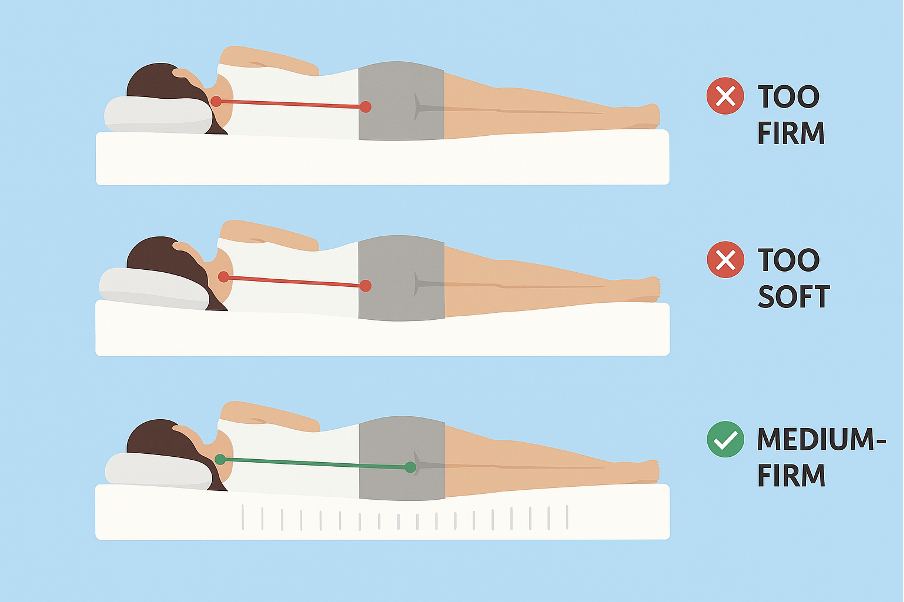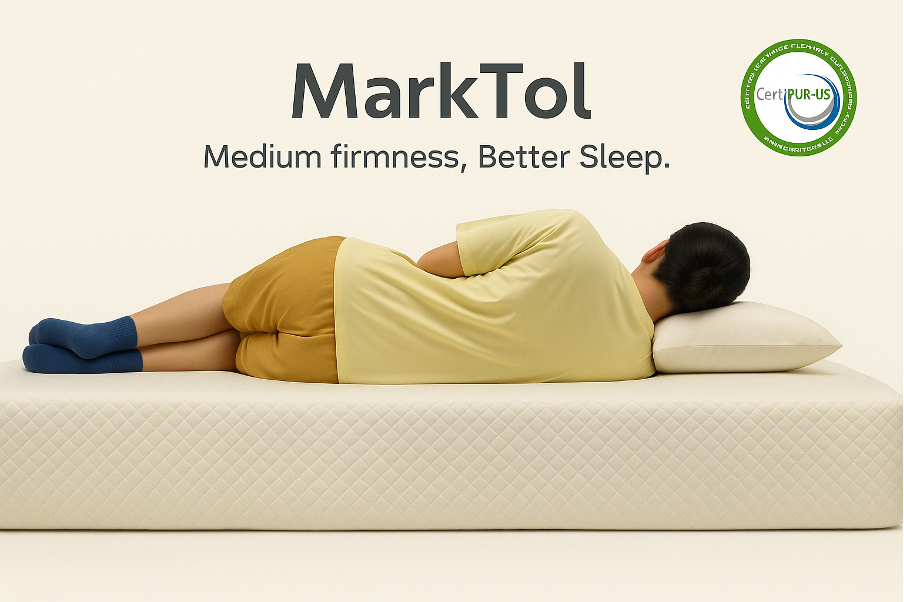Does Your Mattress Affect Sleep Quality? Pro Advice Here
Not sleeping well? The problem might be your mattress, not your stress.
You stick to a good bedtime routine. You don’t scroll your phone late at night. But you still wake up exhausted, like you didn’t sleep at all.
Or maybe your back aches every morning, and you toss and turn all night without knowing what’s wrong.
Here’s the thing: the root of poor sleep is often your mattress.
If your bed doesn’t support your body properly, no amount of early nights or sleep apps can make up for it.
Choosing the right mattress can change everything, from reducing back pain to helping you fall asleep faster and wake up truly refreshed.
Science Says the Right Mattress Can Improve Your Sleep
Research from trusted sources like Healthline and the Sleep Foundation confirms that sleeping on a medium-firm mattress can lead to real improvements in how you sleep.
Benefits include:
- Less pressure on your shoulders and lower back
- Better spinal alignment while you sleep
- Faster time falling asleep and more restful hours
- Fewer aches and more energy when you wake up
In one clinical study focused on people with chronic back pain, switching to a mattress that provided better support led to longer, deeper sleep and noticeably reduced pain.
And on Reddit, a user shared a surprising story. They upgraded to a mattress that looked high-end, but ended up sleeping 40 minutes less every night.
The lesson? A good night’s sleep doesn’t come from a luxury label. It comes from a mattress that’s right for you.
How to Choose the Right Mattress for You
Forget the marketing buzzwords. The best mattress for you comes down to three simple but essential things:
1. Proper Support – Not too firm, not too soft
Your mattress should keep your spine aligned. Medium-firm mattresses are known to work best for most people. They offer just enough support to prevent your lower back from sinking, without making you feel stiff.

2. Pressure Relief – No more waking up sore
A good mattress should gently contour to your body, especially at pressure zones like your shoulders, hips, and lower back. Memory foam helps reduce these pressure points and improves your chances of deeper sleep.
3. Safe, Non-Toxic Materials – Because your health matters
Some cheap mattresses may contain fiberglass or harsh chemicals that release into the air. These can cause skin irritation or breathing issues over time. Always look for mattresses made with clean, certified materials that are gentle on the body and safe for long-term use.
Recommend:MarkTol Memory Foam Mattress
When people shop for a mattress, they usually care about three things:
- Is it actually comfortable to sleep on?
- Does it support the back and hips?
- Are the materials safe and skin-friendly?
The MarkTol mattress was designed to check all three boxes.

Let’s start with the feel: it delivers a true medium-firm comfort.
It’s not too soft where you sink and struggle to get up, and it’s not overly firm like sleeping on a board.
The top layer of cooling gel memory foam gives a gentle sinking feel at first, but you’ll quickly notice solid support underneath. Whether you sleep on your back, side, or move around, it feels stable and easy to shift.
Next is the support.
The base foam is high-density and holds your body well. Even testers weighing close to 200 pounds felt no sagging. Their lower back and hips stayed fully supported throughout the night.
In terms of safety, this mattress scores high:
- No fiberglass: the fireproof layer is made from a newer, skin-safe material that meets regulations.
- The outer knit cover is OEKO-TEX® certified and safe for skin contact.
- The internal foam is CertiPUR-US® certified, making it ideal for households with babies, pets, or anyone with sensitive skin.
And one more thing people often overlook: it’s super easy to set up.
This mattress arrives compressed and rolled. Just unbox it, cut the plastic, and let it sit flat for a few hours. It fully expands with no bad smells or corner sagging. You don’t even need to change your bed frame.
To sum it up, this mattress is for you if you want:
- A bed that’s not too soft or too firm
- To wake up without back or hip pain
- Safe, certified materials that feel good against the skin
- Great quality at a fair price without overpaying
FAQs on Choosing the Mattress
Q1: Is a medium-firm mattress right for everyone?
A: Medium-firm is often called the “sweet spot” for comfort. It offers enough support without being too hard or too soft. It works well for side and back sleepers, most adults between 110–200 lbs, and people with occasional back pain who still want a balanced feel.
Q2: Does memory foam really help with back pain?
A: Yes, if it offers the right structure. Quality memory foam mattresses use a soft upper layer to cushion your curves and a dense base to support your spine. This “soft-on-top, firm-underneath” design helps reduce lower back stress and improve sleep posture.
Q3: My mattress isn’t broken, but I sleep poorly. Should I replace it?
A: If you wake up sore, tired, or just sleep better elsewhere, your mattress may no longer be right for you, even if it looks fine. Most beds need replacing after 7–10 years, and changes in comfort often come before visible wear.
Q4: How can I tell if a mattress is safe?
A: Look for trusted labels like CertiPUR-US® for foam and OEKO-TEX® for fabrics. These mean the materials are non-toxic and safe for skin contact. Also avoid mattresses that contain fiberglass in the fire barrier or give off strong chemical smells out of the box.
Q5: Are foam mattresses too hot?
A: Modern foam beds use cooling gel, ventilated layers, and breathable fabrics to stay comfortable. Unless you sleep in a very hot room, today’s designs are cool and breathable enough for year-round use.
Sleep Doesn’t Have to Be Expensive, It Just Has to Be Right
We sleep every night, but it’s one of the most overlooked parts of our health.
A good mattress doesn’t need to be luxury-priced to make a real difference.
Spending just a few hundred dollars on the right mattress might do more to boost your energy and focus than any skincare routine or daily coffee habit.
So if you’ve been waking up sore, tossing and turning, or feeling tired even after eight hours, maybe it’s time to make a change.
Start by upgrading your mattress. It could be the most valuable thing you do for your well-being.
Media Attributions
- Pi231
- P1111